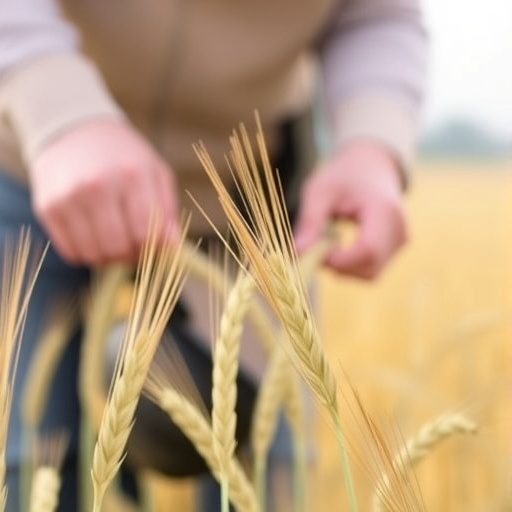Farmers in Northern Ethiopia, particularly those laboring in the malt barley sector, are experiencing a profound transformation in their agricultural practices through the adoption of contract farming. This phenomenon refers to agreements between farmers and buyers wherein farmers commit to producing specific amounts of a crop, in this case, malt barley, in exchange for assured markets and often fixed prices. These contracts have emerged as a key strategy aimed at enhancing productivity, ensuring food security, and lifting the livelihoods of rural families. However, the success of such arrangements hinges largely on the perceptions of farmers and their willingness to embrace this model.
Recent research sheds light on the intricate dynamics of farmers’ perceptions and the actual adoption of contract farming in the region. The findings reveal a complex interplay of factors influencing farmers’ decisions, ranging from economic incentives to social relationships. Farmers engaged in malt barley production have expressed varying opinions regarding the benefits of contract farming versus traditional farming methods. Many perceive contract farming as a means to mitigate market risks, especially given the volatile nature of agricultural prices in Ethiopia. However, concerns regarding the terms of contracts and the power imbalances between farmers and buyers remain prominent.
Adoption rates among malt barley farmers in the study area have been significantly influenced by their previous experiences with market transactions. Farmers who have faced financial losses or had experiences with market failures show a greater inclination toward engaging in contracts that promise more stability. Conversely, those with successful independent farming histories often exhibit skepticism towards these agreements, fearing a loss of autonomy and a decline in the quality of produce standards imposed by buyers.
The research also emphasizes the importance of trust—between farmers themselves and between farmers and buyers. In the absence of established relationships, farmers are less likely to enter contracts, underscoring the significance of social capital in encouraging contract farming. Furthermore, farmers who belong to cooperatives or social groups tend to have higher adoption rates as collaborative networks enhance trustworthiness and facilitate better negotiation power when dealing with buyers.
Moreover, implications of contract farming extend beyond mere economic concerns. Farmers perceive these contracts as a vehicle for accessing agricultural inputs such as quality seeds, fertilizers, and training opportunities. By entering contracts, farmers not only secure a market for their produce but often also gain access to resources that can enhance their farming practices. This dual benefit can result in higher yields and subsequently, improved income levels if contracts are adhered to.
However, challenges remain. A significant aspect of the findings indicates that awareness and knowledge of the specifics involved in contract farming are not uniformly distributed among farmers. Educational initiatives are crucial in bridging the gap that exists in understanding the benefits and potential risks associated with contract farming. Knowledge dissemination through workshops, training sessions, and farmer field schools can empower more farmers to consider the opportunities that lie within contract farming agreements.
The landscape of agriculture is highly dynamic, and with changes in climate patterns and market demands, contract farming could serve as a strategic response to bolster resilience among farmers. The adaptability of contract farming arrangements can lead to more sustainable agricultural practices in the face of environmental challenges. However, crafting these contracts to ensure fairness, equity, and mutual benefit remains essential.
Furthermore, policy implications arise from this research, highlighting the need for supportive legal frameworks that protect farmers and encourage fair negotiations. Government interventions can play a pivotal role in shaping the contract farming landscape by providing guidelines that prevent exploitative practices and enhance the overall security of farmers engaged in contractual agreements.
In addition to economic and policy dimensions, social perceptions of contract farming must be acknowledged. Local narratives about success stories and beneficiaries of contract farming can have a ripple effect across communities, leading to heightened interest and participation. The dissemination of positive outcomes can help shift perspectives and bolster engagement in this agricultural model.
The exploration of farmers’ perceptions towards contract farming in Northern Ethiopia not only contributes to the existing body of knowledge but also opens avenues for further academic inquiry. Future research could delve into the long-term impacts of contract farming on rural economies and analyze performance outcomes in comparison to traditional farming practices. This could provide insights into optimizing contract structures to cater to the unique needs of farmers in evolving agricultural landscapes.
Ultimately, as the study elucidates, farmers’ perceptions shape their responsiveness to market strategies like contract farming. The evolution in the contracting landscape is indicative of a broader trend toward more integrated and market-oriented approaches in agriculture, necessitating continuous assessment and adaptation. An informed understanding of the factors at play will be crucial in ensuring that farmers can harness the full potential of contract farming while safeguarding their rights and livelihoods in an ever-changing agricultural environment.
In conclusion, the research on the perceptions and adoption of contract farming among malt barley farmers in Northern Ethiopia paints a nuanced picture of agricultural adaptation. It emphasizes the need for a holistic approach that considers economic, social, and institutional dimensions to truly capitalize on the benefits that contract farming can offer to rural farmers. Beneath the complexities lies the potential for contract farming to serve as a transformative tool for resilience and success in the agricultural sector.
Subject of Research: Farmers’ perceptions and adoption of contract farming in malt barley production in Northern Ethiopia.
Article Title: Farmers’ perceptions and adoption of contract farming: empirical evidence from malt barley farmers in Northern Ethiopia.
Article References:
Ashagrie, D.S., Nigusie, G.D. Farmers’ perceptions and adoption of contract farming: empirical evidence from malt barley farmers in Northern Ethiopia.
Discov Agric 3, 120 (2025). https://doi.org/10.1007/s44279-025-00306-4
Image Credits: AI Generated
DOI:
Keywords: Contract farming, malt barley farmers, Northern Ethiopia, farmers’ perceptions, agricultural markets, rural development.




